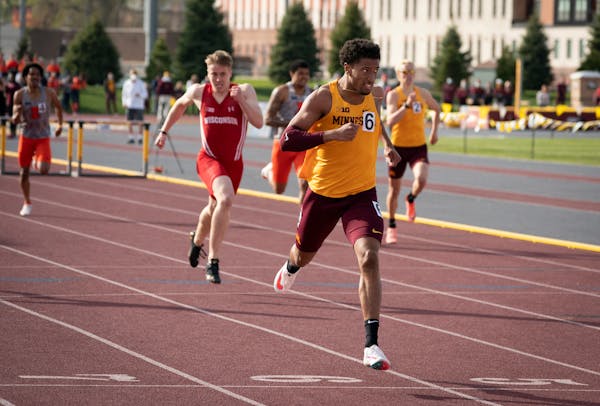Within the first two steps of her 200-meter dash at the M City Classic on April 30, Amira Young knew this could be the race she'd been looking for.
Her arms opened up as she exploded out of the starting blocks, taking the lead from Lane 5 as she entered the final 100 meters and drew on the work she'd done with Gophers track and field director Matt Bingle to find another gear. The junior crossed the finish line comfortably ahead of a field of five, and glanced over at the clock to see if the times had proven her hunch correct.
"After I saw the time, I'm like, 'Whoa,'" she recalled.
The realization she'd toppled the longest-standing record in program history came later.
Young's time of 23.21 seconds smashed the 23.44-second mark Jane Oas set in 1975, giving her the only program record that had yet to be set in this century. That she broke it was something of a fait accompli; she'd run 23.16 indoors, placed fourth in the Big Ten as a freshman before COVID-19 shut down her sophomore outdoor season. She'll have opportunities to break it again with warmer weather and strong competition, possibly as soon as this weekend during the Big Ten outdoor championships in Champaign, Ill.
It also was a footnote for a woman whose pursuit of perfection and love of process drives her more than the digits on a clock.
Young came to Minnesota with a clear idea of what she wanted to do on and off the track, planning to sprint at as high a level as she could and pursue a physician's assistant degree after that. She is a third-generation sprinter whose grandmother Maddie Young ran in high school and college and father Maurice Young competed at Illinois; Amira Young didn't take to the sport as a child, before two years dancing ballet and pointe at Chicago Multi-Cultural Dance Center gave her the discipline she needed for the track.
She often begins her days meditating, before an early-morning weight-lifting session, a demanding class schedule and track practices. Her focus comes from a family with which Bingle connected almost immediately during the recruiting process.
Now, they know his wife and kids, and he knows her younger brother. He and Young can speak directly to one another; she cuts through grueling practices smiling as she makes up a game on the track.
"Within a couple phone calls, you could tell she has a vision of who she wants to be, where she wants to go," Bingle said. "That made it easy for us on our end to say, 'We want this young lady to be a part of our program.'"
Young earned all-city, all-section and all-state honors for four years at Chicago's Whitney Young High School, and broke Tahesia Harrigan's 17-year-old 100-meter dash record during her freshman year at the U. The 200, though, was initially her weaker event, as she worked to acquire the speed endurance she'd need for the latter stages of the race.
An exposure to collegiate training made the difference. So did the occasional 1,600-meter relay. "It's not something I like — and Coach Bingle knows that," Young said with a laugh. "But I understand it helps with speed endurance.
"It's just interesting, the transition. I'm still a good 100 runner, for sure, but I feel like I'm better in the [200] lately."
After she broke Oas' 46-year-old record, Young exchanged a quick high-five with Bingle, and the two quickly shifted to a review of her race.
Her 200 time is the second-fastest in the Big Ten behind Purdue freshman Alyssa Robinson, and the NCAA West Regional qualifier looms 10 days beyond the conference meet. She will be integral to the Gophers' chances of following their conference indoor title with an outdoor championship, and she'll search for faster races in the weeks to come, when training peaks combine with higher stakes.
Any records she breaks as a result are just part of what Young has committed to so steadfastly: the process.
"I think it just comes from how I was raised, with my parents, my grandparents," she said. "We always like to have a plan for something, to have goals on how to get there."
Legendary rugby league star Wally Lewis appeals for concussion and CTE awareness support
LeBron James rants at NBA's replay center for calls, Lakers lose on buzzer-beater, trail Denver 2-0
Hyman gets 1st playoff hat trick, McDavid has 5 assists as Oilers beat Kings 7-4 in Game 1

